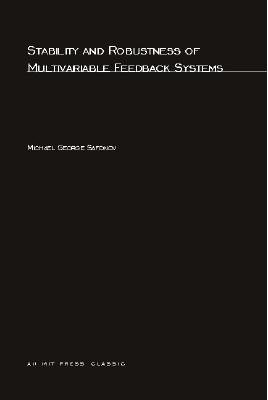This book on stability theory and robustness will interest researchers and advanced graduate students in the area of feedback control engineering, circuits, and systems. It will also appeal to mathematicians who are involved in applications of functional analysis to engineering problems. The book provides a methodology for the rigorous treatment of such inherently feedback aspects of dynamical system design as robustness and sensitivity, just as many researchers are beginning to realize that this type of methodology is mandatory if modern systems theory is to be used to design complicated multivariable and large-scale systems. The main objective of the book is to provide a clear mathematical formulation of the issues that arise in designing feedback systems that are robust against the destabilizing effects of unknown-but-bounded uncertainty in component dynamics. It is the first study to identify formal methods for the quantitative analysis of multiloop feedback system robustness. The view that is presents of nonlinear, multiloop feedback system stability theory is unique, lucid, and conceptually appealing. Lyapunov and input-output stability theories are unified in a new and simple geometrical perspective based on the topological separation of spaces. This perspective greatly facilitates visualization of the underlying conceptual issues in stability and robustness theory and serves to motivate specific results concerning the robustness of feedback systems. Potentially, this methodology may be applied to nonlinear feedback design, validation of modeling approximations, hierarchical control system design, and stability margin analysis for multiloop feedback systems. This book is the third publication in The MIT Press Series in Signal Processing, Optimization, and Control, edited by Alan S. Willsky.

Stability and Robustness of Multivariable Feedback Systems
This book on stability theory and robustness will interest researchers and advanced graduate students in the area of feedback control engineering, circuits, and systems. It will also appeal to mathematicians who are involved in applications of functional analysis to engineering problems. The book provides a methodology for the rigorous treatment of such inherently feedback aspects of dynamical system design as robustness and sensitivity, just as many researchers are beginning to realize that this type of methodology is mandatory if modern systems theory is to be used to design complicated multivariable and large-scale systems. The main objective of the book is to provide a clear mathematical formulation of the issues that arise in designing feedback systems that are robust against the destabilizing effects of unknown-but-bounded uncertainty in component dynamics. It is the first study to identify formal methods for the quantitative analysis of multiloop feedback system robustness. The view that is presents of nonlinear, multiloop feedback system stability theory is unique, lucid, and conceptually appealing. Lyapunov and input-output stability theories are unified in a new and simple geometrical perspective based on the topological separation of spaces. This perspective greatly facilitates visualization of the underlying conceptual issues in stability and robustness theory and serves to motivate specific results concerning the robustness of feedback systems. Potentially, this methodology may be applied to nonlinear feedback design, validation of modeling approximations, hierarchical control system design, and stability margin analysis for multiloop feedback systems. This book is the third publication in The MIT Press Series in Signal Processing, Optimization, and Control, edited by Alan S. Willsky.